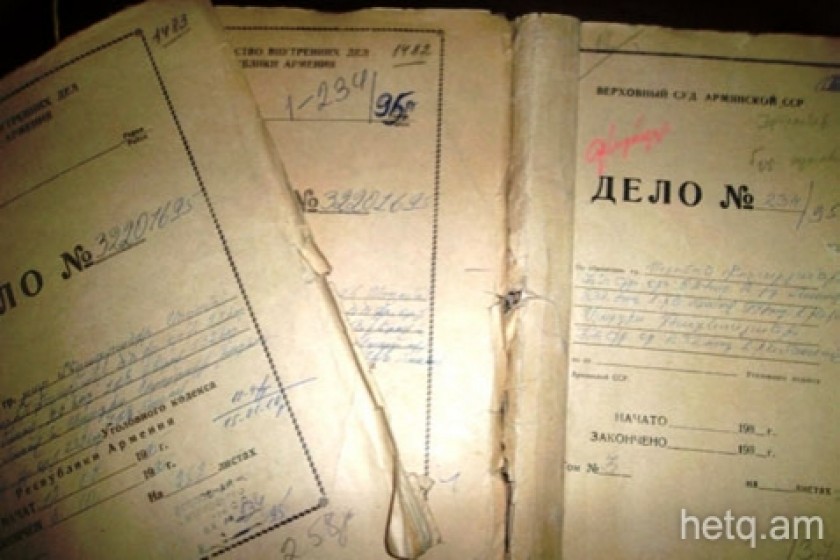
Order in the Court: Armenia Appears Reluctant to Review Possible Infractions in the Judicial System
I didn’t know what to expect when I entered the court archive in Yerevan to study the criminal cases in early post-Soviet Armenia.
It was a part of the “Distorted Destinies” series of articles; a joint program of Hetq and the Armenian Innocence Program.
I came to focus on those who fought in the Artsakh War and were later given a death sentence and life imprisonment, on those arrested between the ages of 18 and 21, and on those being tried in legal cases stemming from events that occurred while doing military service.
Most were sentenced in the previous century and claim that they are now being bars due to judicial infractions and mistakes. Thery are gfighting to have their sentences reviewd.
They d not even have the opportunity to petition the European Couurt of Human Rights, since they were sentenced before Armenia joined that body.
Why I decided to brush the dust off old criminalmcases
My main aim in doing so was to show the Armenian public how people were sentenced to death and life imprisonment in the early 1990s. Back then, public attention wasn’t focused on such cases. There was no developed judicial reportage like today. You’d be hard-pressed to see one or two court reporters in those years. Today, there are cases broadcast live news websites.
In addition, the activities of the international Innocence Project, where experts fight to correct the mistakes made by the courts and to free those mistakenly found guilty, was a big factor. Through DNA testing, the project has freed many individuals wrongly sentenced over the past 25 years. Based on this example the Armenian Innocence Project was created. And its aim is the same.
Another boost is that we have been petitioning state bodies for the past four years to review the criminal cases in which individuals have been sentenced to the full extent of the law. But our efforts have been in vain.
No state agency has been willing to review those cases in an attempt to understand what became of the judicial system in Armenia during the post-Soviet transition phase.
What I saw in the archives
Hetq has been the only news outlet in Armenia to invesitagte this issue. For the past four months we have been exposing the hidden episodes of the court and legal system to the public. By researching ten cases, holding discussions with legal experts and listening to the opinions of specialists, I have come up with the following similarities.
In the sentences in all the cases, one sees the expression – Destroy material evidence. One gets the impression that the government has carried out a great crime and has erased the traces; just like a skillful criminal. However, due to the wonders of science, we are now able to reopen the cases of those sentenced to life imprisonment due to the preservation of material evidence.
In Great Britain, 300 convicts have been freed in the past three years via this method. In Armenia, sadly, convicts claiming judicial infractions come up against a stone wall, since the government has legally destroyed everything.
Secondly, even the formal aspect of criminal case materials reminds one of the Soviet system. Verdicts were handed down not in the name of the Republic of Armenia but, as seen in a 1996 case, in the name of the Armenian Soviet Socialist Republic. (Even after independence, Armenian courts were still using the old Soviet Armenian blanks). In general terms, in the first ten years of Armenian independence, the courts still followed the 1961 Soviet Criminal Code.
Third, all criminal cases materials are written by hand. One needs to be a cryptographer to makes heads or tails of them. Nothing is digitized. Back then, of course, court stenographers would be busy recording the minutes of trials. Trials resulting in death sentences would average three volumes. There were hardly any photographs of the crime scene. Today, crimes can be re-enacted through 3D modeling. Here in Armenia, this too is impossible.
Next, the number of forensic examinations ordered is so few that one gets the impression that a special effort was being made to cut down on state expenditures.
The systems are silent
While exposing “distorted destinies”, I came across instances where MPs and government officials said “We’re doing good work.” But saying so isn’t enough. State agencies must realize the importance of looking into possible judicial infractions. They must be willing to investigate such cases and come up with methods to correct such infractions. We are talking about people’s lives here.
Haroutyun Mansouryan, who runs Justice Division of the Media Initiatives Center, told Hetq that press investigations merely resonate in the hearts and souls of people. They do not impact on state agencies, on the system itself.
So what is preventing the government from looking into these cases? The reason is simple. There is no understanding of the issue; neither then or now. The same faces comprise the judicial-legal system. They have no reason to expose infractions or breaches in the system they oversee. They do not want to be held accountable.
Hitting people in their hearts
Just a few years ago the term ‘innocent convict’ was never used. No one ever spoke about judicial cock-ups and infractions.
Today, the public believes that one can find indivdulas serving time in Armenian jails who were wrongly found guilty.
Thus, we once again call on those serving time and who are struggling for the resoration of justice, to get in touch with Hetq.
Write or phone us with your stories. We can only improve things by exposing the mistakes that have been made and conveniently swept under the carpet.
 Videos
Videos Photos
Photos




Comments (11)
Write a comment